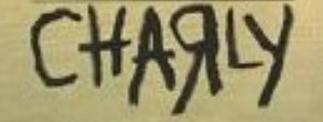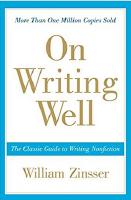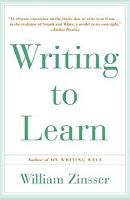DeLoggio Achievement Program
Preparation for and Selection of College and Professional Programs
Writing is Everything!
Philosophy of Education
Writing
Home Schooling
Educate Yourself!
Wiki Knows!
YouTube
Will Show You
Culture by Cinema
Writing is as pervasive in our world and as essential to our life and development as air. From the first childhood struggles to proclaim our identity in letters, writing is both the way we think of ourselves and the way the world perceives us (one of the subthemes of the book "Flowers for Algernon," developed from the short story, "Charly").

Writing is not only the primary way in which we communicate with each other; it's also the primary way in which we organize and develop our own thoughts. If we can't commit an idea to writing in a way that communicates itself to the reader, we probably haven't really understood the idea on a level that communicates something to ourselves.
Our daily speech overflows with idioms that proclaim our lack of vocabulary. How many things do we "do," for lack of a more precise verb? We do lunch rather than dine together; we do a movie instead of watching it, and we may accompany the movie by doing a pizza and some beer, or a bit of weed. But we don't cook the pizza, or order it, or eat it. We may as well have sat on it, or seen who could throw it up to the ceiling and get it to stick. All of them are equally possible things to "do" with the pizza, if not equally appropriate.
And as I talk about and implement the basics of writing, I also include the more advanced "thing" necessary for good writing; I vary my style and sentence structure, along with the length of the sentences. I sometimes quite consciously use parallel construction in both sentence formation and tone, to subconsciously persuade the writer that if the first sentence is good, so is the second. And then I break up the monotony by pointing out how really dull it would be if all my sentences sounded like those two.
 |
Writing is thinking. Writing is honing an idea by choosing the words that represent the idea. That's why for the basics I recommend William Zinsser's "On Writing Well," while for clarity of communication I recommend Zinsser's "Writing to Learn." |  |
The articles on writing could have gone in virtually any section of my webpage. And that's precisely why it's here in the philosophy of learning section; because everything in this section is fundamental to any other form of learning.
Quora Copyrighted MaterialsAll the links below this box are owned jointly by Loretta DeLoggio and Quora. Be sure to follow the Copyright rules for both organizations when using this material. |
How do I improve, increase, and understand my vocabulary skills better?
How do Harvard students or other Ivy League students build their vocabulary and speech skills?
How do I write an essay on court cases?
What is the best way to learn English tenses?
How do I write good articles about a subject that I don't know anything about?
Is using "should of" instead of "should have" grammatically correct?
Do you ever get mixed up when to use have or has?
What is the nature of 'it' in grammar?
What is the correct way to use the word "yet"?
When should ‘is’ or ‘are' be used?
What is the proper usage of "wrote" compared to "written"?
We offer two different courses to improve your writing skills.
One is an elementary course in sentence structure, verb forms, punctuation, and parts of speech. It includes roughly 20 lessons of about two hours each. The textbook for the course is
the Harbrace College Handbook.-
Another is a course on writing style, and focuses on clarity, conciseness, and persuasiveness.It consists of 5 to 10 lessons of about two hours each, with significantly more homework. The textbooks are primarily the two Zinsser books linked above.
The fee for each course is $500 USD. Teaching can be done in person, but Skype is equally acceptable.
| Copyright | Take me to Home Page |